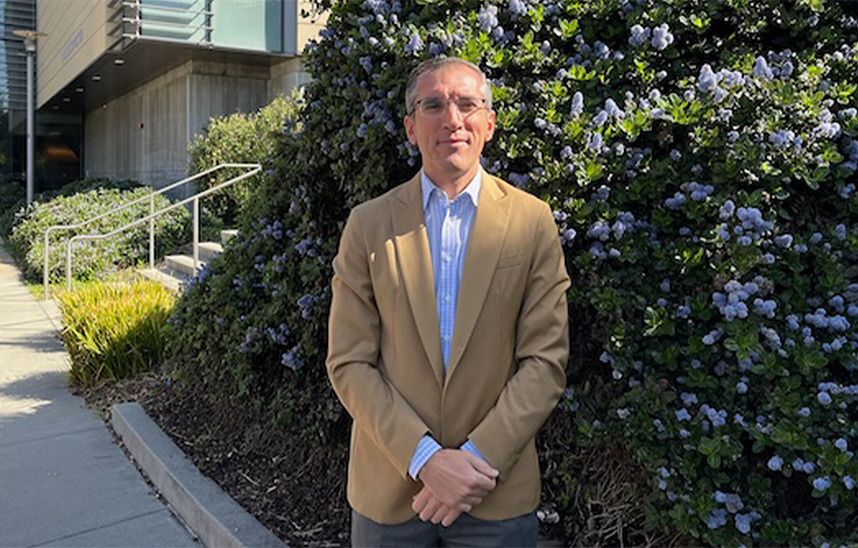"Risks are opportunities, and the culture of the country pushes you to take them."
Interview with Professor Miguel García-Valdecasas about his research stay in Berkeley (California, USA).

Miguel García-Valdecasas, professor at department of Philosophy, is currently on a stay at the University of Berkeley (California, USA). There he is doing research on his specialization program, Philosophy of the Mind, together with professor, biologist and colleague Terrence W. Deacon.
Garcia-Valdecasas and Deacon study the human mind in an interdisciplinary way. The researchers believe that there are organism-like forms of organization that are what gave rise to life, and ultimately, to much of what we understand as mind. All forms of organization that, like the mind, act for a condition have a line of continuity with each other, which is the tendency to mitigate the effects of disorder, also called entropy. "My intuition is that this tendency is more basic than life, although life emerged as an effect of it and is its best expression," explains Professor García-Valdecasas.
Q. Could you explain what your line of research is about?
R. In California, I am studying causal, or explanatory, models of the origin of life and of biological consciousness, which any life form that can be said to "feel" has. My interest in the mind-brain problem led me to look for the origin of biological consciousness and deliberate action in forms of organization much simpler than a cell or any of its parts. We have termed them "autogene." These organizations cannot be said to be alive, because they lack metabolism and the capacity for self-reproduction, but they act to resist or mitigate entropy.
Q. Why did you decide to stay at this university?
R. In 2019 I interned at the University of California with a scholarship from mobility senior. I met Professor Terrence W. Deacon and we have continued to collaborate ever since. Deacon is a biologist who has studied brain evolution and does an experimental research on brain functions.
In the summer of 2022, he invited me to work with him for a longer period of time, and from that came the plan that has allowed me to join his group at research this academic year. Apart from this, the University of California, Berkeley, is one of the best in the United States. Its professors and alumni have received 55 Nobel Prizes; in the last 5 years, they have received 5. And it is possible to access them because they are frequently seen in the campus.
Q. How will this stay help your research ?
R. The ideas we are working on came out of my first stay at Berkeley. We studied a boundary problem between Philosophy, biology and physics that many consider unsolvable.
The mind and the brain are united by more than the fact that they need each other. Our intuition is that what explains their union is teleology, that is, the explanation of processes by their end rather than by their cause. Few people believe that teleology and the mind-brain problem are related; they consider it a hindrance rather than a necessary complement to molecular biology and Genetics. However, molecular or genetic interactions do not explain why the hand is raised, they only show it in a detailed and systematic way. Only by knowing very well how life and the brain work, and the philosophical consequences of the processes that sustain them, can a problem of this magnitude be studied. We still know very little, but if we consider teleology dispensable, we will know less and less.
Q. What have been the challenges you have faced at the academic level?
R. Adapting to the research culture and the way of arguing philosophically in Anglo-Saxon countries is a challenge. They write in a very linear way, no reasoning is accepted if it has omissions core topic or disordered aspects. This forces you to make an effort B of adaptation, and to revise many times what is said or written.
In terms of the culture and expectations of research, the United States is a country tolerant of risk and disruption. In recent years, I have spent time to better understand the fundamental principles of physics, complex dynamical systems, and parts of Genetics, something that forces you to step out of your comfort zone and take risks. Risks are opportunities, and the culture of the country pushes you to take them.
Q. What excites you the most or has caught your attention during your stay?
R. The opportunities in Northern California. The San Francisco Bay Area, where almost 8 million people live and where Berkeley is located, is one of the most dynamic areas in the world. It concentrates a huge investment in technology and the so-called "unicorns" of the United States, companies subject startups that are created and sold very quickly.
In this environment, the universities of California, Berkeley and Stanford, produce engineers who work at major technology companies such as Google, Apple, goal, OpenAI, etc. At the same time, they directly or indirectly finance the universities. This attracts and concentrates a good part of the technological talent in the country and in Asia and makes for enormous wealth, as it is the destination for venture capital companies. It is the place where anyone who has an idea or a dream to sell in the field of technology comes to.




